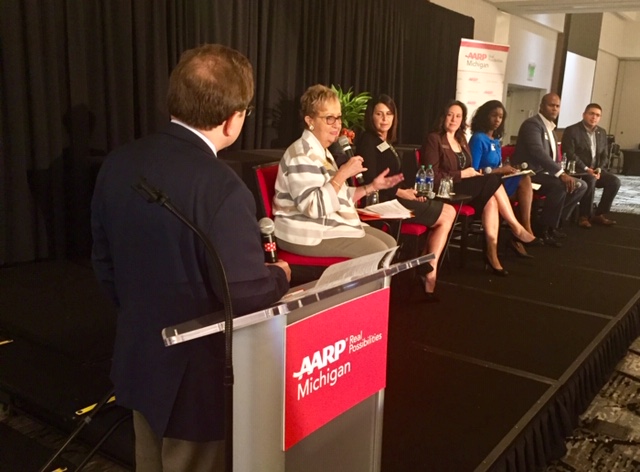AARP Hearing Center

Gov. Gretchen Whitmer announced Oct. 7 that Michigan has joined the AARP Network of Age-Friendly States and the World Health Organization Global Network of Age-Friendly Cities and Communities.
The action is intended to help the state prepare for dramatic and imminent demographic changes and ensure that Michigan communities can take steps to accommodate all ages.
The state’s application was accepted by AARP and the World Health Organization and certification was awarded. Michigan becomes the 5th state to join the network. The others are Colorado, Florida, Massachusetts and New York. Virgin Islands, a U.S. territory, is also in the network.
“We are the first Age-Friendly State in the Midwest,” Whitmer said at the AARP Michigan Age-Friendly State and Communities Conference in Lansing. “We want to make sure people can age in place in their homes and communities.
“Active aging is a life-long process and making communities more age-friendly is a commonsense policy approach for responding to demographic aging,” the Governor said in Michigan’s application letter. “I look forward to continuing to work with (AARP) on behalf of our residents to ensure that Michigan is a leader among states in healthy and active aging for all.”
The population of the United States is rapidly aging. By 2030, one of every five people in the U.S. will be 65 or older. By 2035, for the first time ever, the number of adults older than 65 will be greater than the number of children under 18.
The aging demographics are even more pronounced in Michigan where residents 50 and older currently make up 37 percent of the state’s population. The percentage of people age 65 and older will be greater than one in five and the percentage of seniors age 85 and older will double by 2050. By 2025 – 10 years ahead of the national projection – Michigan residents 65 and older will outnumber those younger than 18.
“It’s critical that Michigan takes steps now to make sure communities are ready to meet the needs of all ages as the population shifts,” said Paula D. Cunningham, State Director of AARP Michigan. “We’re talking about everything from walkable downtowns and opportunities for work and volunteering, to access to health care, housing and transportation options. We want to help make Michigan the best state it can be.”
The announcement came at the opening of a day-long AARP Michigan Age-Friendly State and Communities Conference that included expert speakers and participation of about 200 city planners, elected officials, health care professionals, concerned citizens and others.
A panel of mayors of cities already in the Age-Friendly Communities Network – including Rosalyn Bliss of Grand Rapids, Derek Dobies of Jackson, Andy Schor of Lansing, and Kenson Siver of Southfield – discussed why they supported the move to join.
“We want to be cities that are great for everyone, especially for older adults,” Bliss said. “I am extremely concerned about isolation and social connection. People are dying because they’re isolated.”
Siver said his city is among those that are rapidly aging.
“We face changing demographics. The city needs to keep up,” he said.
Dobies said Jackson has a vocal group of AARP advocates who brought the age-friendly idea to him. He was glad to move forward on it. He said the community was already doing some of things required by the age-friendly action plan, adding it was beneficial to have an overall plan.
“We have a City Council that is really supportive,” he said.
First-term Mayor Schor said he ran on a platform of growth, education, neighborhoods and infrastructure.
“Age-friendly communities hits all of them,” he said. “We talk about Lansing for a lifetime.”
The day’s events also included a panel of legislators who are supportive of the age-friendly state and communities movement.
Rep. Kathy Crawford, R-Novi, who mentioned she’s the oldest member of the state House at 77, said housing is a major concern in her community.
“Affordable, age-friendly housing is a huge issue. It’s the greatest need in our area,” she said.
Crawford also noted that there are several Michigan counties where nearly two-thirds of residents are 60 and older.
Rep. Alex Garza, D-Taylor, said: “Walkability is a problem. We need to keep people safe and get people where they want to go.”
Rep. Kyra Bolden, D-Southfield agreed.
“We need to make sure we have walkable communities,” she said.
Rep. Bronna Kahle, R-Adrian, said getting around is also an overriding concern in her rural area.
“Transportation is the number one issue in my county,” she said.
Rep. Joe Tate, D-Detroit, is a military veteran and he puts veterans’ needs at the top of his priority list.
“Ninety percent of veterans are 55 and older,” he said, adding that fewer than one in five are getting the benefits and services for which they are eligible.
But Gov. Whitmer’s announcement about making Michigan an age-friendly state carried the day.
“I think it’s huge. It’s all about priorities,” Siver said.
“That elevates senior issues in the minds of people,” added Rep. Angela Witwer, D-Delta Township.
During a news conference at the event, Whitmer reiterated her support for repealing the state’s pension tax.
“When you play by the rules, when you pay your fair share, you should be able to keep your fair share when you retire,” the governor said.
Attendees at the conference said on event evaluations they received valuable information.
“The breakout sessions and the chances to ask questions were great,” one respondent said.
Another enjoyed “case studies from Southfield, Grand Rapids and Auburn Hills.
AARP drew plaudits for “the resources that are available about housing options.”
One attendee said information about “the substantial demographics shift in Michigan” was interesting and helpful.
Finally, one respondent noted: “The information we heard from mayors and state lawmakers about what they’re doing to make the state and communities age-friendly” was valuable in helping Michigan to move forward.































































